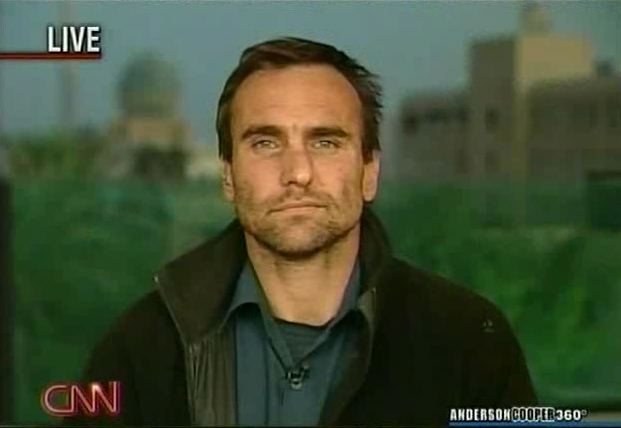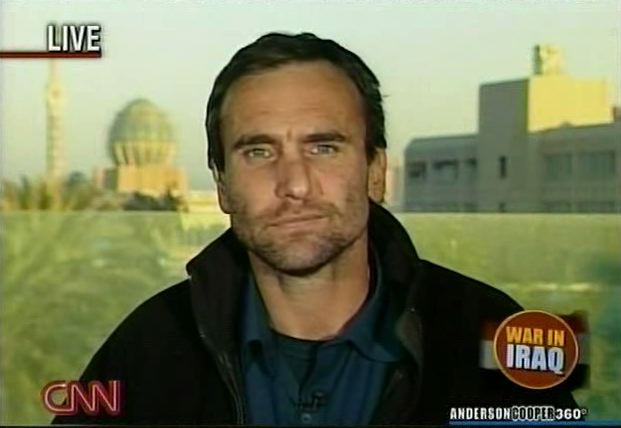AC: "So much blood has been spilled here..."

Click photo to play
Length: 2:40
JOHN ROBERTS: More now on the developments today from CNN's Michael Ware in Baghdad, where it is also just becoming daybreak. Michael, how could these new relationships change the landscape in Iraq? There are many people who believe that Iran already wields more power in certain sectors of the Iraqi government than the United States does. Put that together with Syria, and does it become much more powerful?
MICHAEL WARE, CNN CORRESPONDENT: Well, absolutely, John.
I mean, in fact, it's almost apparent that no matter who is footing the bill, no matter who has the 141,000 troops here on the ground, be that America, it's nonetheless Iran which has greater sway within key elements, key factions of this government than does Washington already.
Now, this is not a new relationship. It's not even a new series of relationships. Baghdad and Tehran have been talking to each other almost since the beginning. We saw, under Prime Minister Jaafari, and now under Prime Minister Maliki, the closeness of that relationship become even greater.
I mean, it is nothing new, in that sense. We have an Iranian ambassador here in Iraq. And, with Syria, though this is now the formalization of the renewal of the relationship, there has been communication between Baghdad and Damascus for some time now.
The question is whether it's in anyone's interest for the instability to end, essentially, for the attacks against U.S. forces to stop. And the answer is no. These guys can talk as much as they like, but, even here in Iraq, it's still within many people's interests within the government to see the Americans attacked.
ROBERTS: Yeah. I was wondering, though, in terms of the sectarian warfare that threatens to tear the country apart, Michael, with both Syria and Iran now getting involved in a diplomatic level with Iraq, is there any expectation that that sectarian violence might diminish some, at least during this period of increased diplomatic overture?
WARE: No, not at all, not in the slightest. There's no indication of that. There's no suggestion of that. No one is saying that.
And, quite frankly, there's no incentive for that. I mean, the U.S. -- General Casey, Ambassador Khalilzad, the U.S. ambassador to Iraq -- have made it very clear. They say that both Syria and Iran are fund-- are arming and funding insurgents, and, indeed, are directly contributing to and inflaming the sectarian violence.
They have been doing this while they have been talking for a year anyway. This makes absolutely no difference to the civil war whatsoever.
ROBERTS: Another day of good news from there.
Michael Ware, as always, thanks very much. Appreciate it.

Click photo to play
Length: 4:36
JOHN ROBERTS: CNN is following this story live from inside both Iran and Iraq. Joining me from Tehran is Middle East Correspondent Aneesh Rahman; and from Baghdad, CNN's Michael Ware.
Michael, we just heard Jamie McIntyre and Barbara Starr talk about rogue elements, militias that are funded by Iran. That's long been known about on the ground there in Iraq, but is there growing concern about the size of this particular rogue element, 10,000 fighters according to McIntyre?
MICHAEL WARE, CNN CORRESPONDENT: Well, look, this is absolutely nothing new. As you yourself said, John, I mean, the fact that Central Command is now suddenly saying that it is concerned that this may be developing is frightening in itself. I mean, Central Command has known this. They, like us here on the ground, have been mapping the breaking away of the factions from Muqtada al-Sadr's Mahdi Army.
So, I mean, this is not startling in the least. What's startling is the fact that Central Command is only saying it now and encouching it in such careful terms.
We have seen that as elements break away from the mainstream of the Mahdi Army, Iran has stepped in to support them.
Now, we are seeing Iran stepping in to poach them and draw them away. This is a period of Iranian ascendancy. Syria will be capitalizing too, while America appears weak, with its wheels spinning in the mud here in the region.
ROBERTS: Iranian ascendancy. Aneesh Raman, do you think that Iran is genuinely concerned about the spiraling level of violence in Iraq? Or are these talks purely designed to upstage American efforts?
ANEESH RAMAN, CNN MICCLE EAST CORRESPONDENT: Well, I don't think anyone expects any change on the ground because of the talks this weekend. It is, as you mentioned, political theater more than anything else.
But Iran doesn't benefit from an Iraq that completely falls apart. It benefits from a simmering situation because it has leverage over the United States.
And as things have gotten worse, we have seen a decrease in the public calls by Iranian leaders for the U.S. to get out now. There is a quiet sense within the government that if the U.S. were to do so, Iran would be left with the situation in Iraq and would be left fighting a Sunni insurgency that is in part fighting against Iranian influence and not just the Americans.
ROBERTS: Michael, do Iran and Syria have the influence to curb the sectarian violence that's brewing between Shiites and Sunnis. You know, Syria is allowing these Sunni fighters and Sunni supporting fighters to cross the border into Iraq. On the west, the Shiite government of Iran is funding these Shiite militias and these breakaway groups as we mentioned. If they wanted to, could they say, enough, stop?
WARE: Well, they could do that and that would curb the limit of their involvement. But the fact is that the civil war here in Iraq that stemmed from those circumstances under the American occupation now has its own momentum.
So, even if you could seal the borders, so much blood has been spilled here, nothing can turn back that tide. Certainly, not anything in the immediate to near term. And there is simply no reason for these countries to stop. Now is their moment of advantage and they're going to press it while there is a period of strategic uncertainty in the United States and America is unable to exert its will here in Iraq. We're seeing more of the will of Iran being displayed than that of Washington here on the ground.
ROBERTS: Aneesh Raman, you've spent an awful lot of time in Tehran. You were also recently in Baghdad. We spent some time there together, and Michael as well. And you talked to a lot of people on the streets of Tehran. Did they support their government's involvement with these Shiite militias across the border in Iraq?
RAMAN: Well, publicly they mimic everything that the government says. You know, Iranians are observers. They're not participants in this theocracy, nor are they participants in its decision making.
When you talk to them about foreign affairs, they really start to tune out. They don't pay much attention here on the ground. Why? Because their domestic concerns trump everything else. There's high unemployment, high inflation. Iran's president was elected to fix both. He hasn't. And it's actually hard to find anyone here who thinks Mahmoud Ahmadinejad will win reelection because of that.
So all of this is more a political theater to them. They can't do much about it. It's where their government is choosing to go. They are a bit concerned in the situation in Iraq. They're watching it closely. They are quietly concerned that Iran is spending so much money in Lebanon, in the Palestinian areas, in Iraq and not as much at home, but there's very little they can do about that.
ROBERTS: Another emerging and interesting dynamic in a place that never seems to cease surprising us.
Aneesh Raman in Tehran, Michael Ware in Baghdad, thanks very much.
